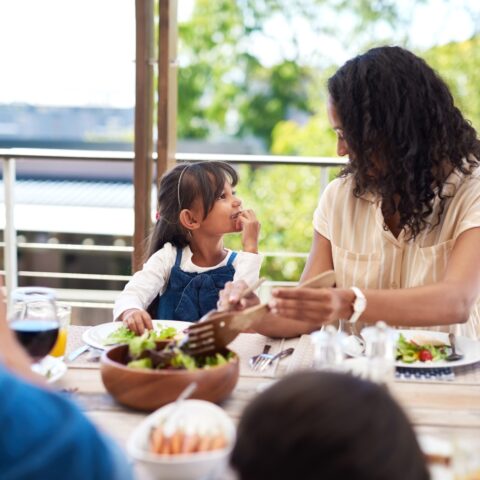Rich in Simplicity: A Health- and Environmental-Conscious Holiday Guide

Gathering for the holidays and important family events can be some of the most meaningful moments we look forward to throughout the year. Leading up to these occasions we anticipate reuniting with loved ones; mull over how to budget our time, money, and energy; and often face a reckoning between these two.
Themes such as light, abundance, birth, hope, faith, family, generosity, and resilience run strong through the winter holidays. To honor these values and themes no matter your family background or cultural celebration, we’ve collected perspectives and tips from multiple experts on how you can enjoy a simple, sustainable, and meaningful holiday season with your wallet, your health, and the environment in mind.
RELATED—Pomegranates: A Powerful Fruit for Health and Cultural Significance
Indulgence Can Exist within Simplicity
Abundance and generosity don’t need to be synonymous with exorbitance or recklessness. By shifting from excess to intention and focusing on mindful spending and simple yet rich dishes, you can indulge over the holidays in a way that’s both luxurious and meaningful—without the stress or guilt.
Erin Rhae Biller, ND, FAIHM, is a whole foods nutrition recipe developer, and integrative health and wellness advisor who reminds her patients of the impact this reframe can have on their health: “The holidays don’t need to be a time of excess and gluttony. True indulgence can be found in simplicity, where the focus shifts from abundance to nourishment. A few well-chosen, nutrient-dense meals can be a celebration of health, giving you the energy to embrace the season with ease.”
If you’ve historically felt the tug between honoring traditions, staying on budget, and not wanting to feel the need to “detox” after December, this approach can help you align indulgence with mindfulness, relying on practical solutions to balance these priorities.
Tips
- Choose one highlighted dish, like a roasted turkey, baked salmon, or stuffed Portabella mushrooms, and build the rest of the meal around lighter, complementary sides.
- Opt for whole, seasonal ingredients like roasted butternut squash or sautéed greens with garlic to create vibrant, satisfying dishes without prep complexity.
- Simplify your family’s favorites. Instead of mashed white potatoes drenched in butter and cream, roast sweet potatoes with olive oil and fresh rosemary for a flavorful choice that helps avoid post-meal bloating and fatigue.
Mindful Spending, Meaningful Meals
One of the first things that comes to mind for many when the holidays are around the corner is the cumulative cost the season incurs. Often deemed the season of giving, many go into debt, even if just temporarily, to keep up with societal or self-imposed expectations.
It’s like “keeping up with the Joneses” if the Joneses of decades past now had a social media account with affiliate links. From the convenience of your phone, you’re able to purchase everything from trendy trinkets to large experiences that most shoppers can only afford over interest-laden installments.
Holiday food and beverages are another category of expenses that end up presenting the same opportunity for seasonal splurge. And it makes sense when many of the idyllic representations of this season are excessive, unrealistic, and often incredibly wasteful. We can all think of a movie involving home kitchens or holiday hotels filled as far as the eye can see with multi-tiered cakes and breads tied with bows, sweets wrapped in plastic, and gourmet dishes aplenty.
But what does this excess of treats add to the holiday that we will actually remember for years to come? What of this represents and gives meaning to our values and holiday traditions?
Since food is often what people gather around for many of these traditions, spending intentionally on your own holiday menu or items you bring to potlucks can serve as an anchor for your season. This decision alone can help you stay present in enjoying the meal and the moment, and less time afterward clouded by the stress of lingering credit card payments when the season is long gone.
How can we give more meaning to the expense of the holidays? We might start by recognizing that the money we invest can be an act in itself of honoring the reasons we celebrate the season.
If so, then, what’s worth the investment? Where can your hard-earned dollars really make a difference when providing food and beverage for yourself and those who gather with you?
Erik Oberholtzer, a renowned chef, author, and founder of Tender Greens, shares a few recommendations you’ll want to save and plan accordingly for your next holiday or family event:
- Spend less on highly processed extras like pre-made desserts.
- Invest in high-quality ingredients that have a large impact on the meal or pack a punch for your health, like proteins and herbs.
- When purchasing large meats like a free-range turkey, consider pre-ordering from a local farm with responsible and sustainable practices.
- How to Upgrade: Choose a pasture-raised bird that was processed on that same farm and never frozen.
Dr. Biller speaks of her many patients who reflect throughout the holidays on the seasonal indulgences that often leave them feeling drained. Beyond practicing mindful spending by collaboratively and proactively budgeting with others in your family unit or circle of friends, she recommends ways of eating during this time that are focused on nourishing foods to make all the difference.
“It’s not about deprivation,” she says, “but about choosing meals that can support tradition as well as long-term vitality, so you don’t have to spend the new year recovering.”
Elevate Flavors with Simple Techniques and Less Waste
One of the first steps to elevating flavors is through doing less. There’s no need to get caught up in creating a fancy and complex flavor profile by adding several ingredients, or spending hours trying out difficult, labor-intensive techniques. Oberholtzer shares that tapping into the science of simple cooking methods can actually amplify flavors and certain qualities of ingredients without any added sugars or pricey equipment.
“Organic sweet potatoes and yams are so packed with their own sugars, there is no need to add sweetness,” Oberholtzer says. He recommends caramelizing these root veggies by searing cooked slices in olive oil until crisp to deepen their sweet flavor.
Of course, food waste is another essential consideration, not just during the holidays, but year-round. Robert Egger, author, longtime board member of World Central Kitchen, and founder of DC Central Kitchen (which has produced over 50 million meals, primarily made with donated foods) says Americans waste an estimated 30-40% of the food we purchase every year. So, it’s important to consider not only how much you actually need, but also to prioritize ingredients and main courses that lend themselves to reuse.
Egger loves encouraging new students in DC Central Kitchen’s job training program to talk about their favorite food memories. “Most would talk about holiday leftover meals,” he says. “Or pies and desserts made with aging fruits. It was a fun way to get them thinking about food, food waste, and the magic of cooking—how they could use their family memories to help us prepare meals for folks on the streets.”
Some families cherish turning holiday leftovers into creative dishes in the days following a big meal. Think turkey soup simmered with vegetable scraps, cranberry sauce baked into grain-free breakfast muffins, or mashed sweet potatoes reimagined as a savory shepherd’s pie.
“We all have those memories,” reminds Egger. “We need to remember them when it comes time for grocery shopping so we can realize what we can do if we embrace the real power of food and the idea of no waste.”
For more inspiration, explore the following recipes that incorporate popular leftover holiday ingredients (like chestnuts, parsnips, sweet potatoes, cranberries, butternut squash, and apples):
- Chestnut Parsnip Soup: A creamy and savory soup combining chestnuts and parsnips, perfect for a warm holiday starter.
- Apple Cider Roasted Vegetables: Seasonal vegetables roasted with apple cider, offering a sweet and tangy flavor ideal for festive gatherings.
- PaleoFLEX™ Sweet Potato Biscuits: Fluffy biscuits made with sweet potatoes, a delightful addition to any holiday meal.
- PaleoFLEX™ Homemade Cranberry Sauce: A naturally sweetened cranberry sauce that pairs well with holiday entrees.
- Sweet Potato Casserole with Pecan Streusel Topping: A healthier take on a classic dish, featuring sweet potatoes and a crunchy pecan topping.
- Breadless Cauliflower Stuffing with Turkey: A grain-free stuffing alternative using cauliflower and turkey, full of traditional flavors.
- Turkey & Apple Stuffed Butternut Squash: Butternut squash filled with a savory mix of turkey and apples, combining seasonal produce in a hearty dish.
- Butternut Squash Chili: A warming chili that incorporates butternut squash, perfect for cold winter nights.
- PaleoFLEX™ New England Gingerbread Cookies: Spiced gingerbread cookies that are both festive and Paleo-friendly.
- Healthy Apple Crisp: A comforting dessert featuring baked apples and a nutty topping, ideal for holiday celebrations.
Tips
- Focus on fewer, nutrient-dense ingredients. This can enhance flavor and support health by reducing inflammatory triggers found in processed foods.
- Save carrot tops, onion skins, and herb stems to simmer into a rich broth.
- Roast extra sweet potatoes to use in a breakfast hash with eggs or blended into a soup.
- Reuse cranberry sauce as a base for salad dressings or as a whole food sweetener.
Make It a Ritual to Shop Locally and Seasonally
“The path to a great meal begins with the shopping list,” advises Oberholtzer. He sets aside the entire day ahead of a big meal, “visiting markets, farms, and artisans who offer the absolute best of what is available.”
While you may not have the time or resources in your area to replicate Oberholtzer’s ritual, it can still be worth it to familiarize yourself with local vendors and their availability within your own local food network. Can their products be found at the weekend farmers market, a mom-and-pop store, or do you have to drive to the source? Knowing ahead of time will making planning easier when the time comes.
I will travel 40 minutes to Metropolitan Seafood for the very best fish, chat with the owner, his crew of mongers behind the counter, and taste a few samples for a deeper experience. The same is at Lima, 22 minutes away, where I love driving the long path between pastures of cattle, turkeys, chickens, and lamb all protected under the watchful eye of nine Great Pyrenees [dogs] before arriving at the small farm store surrounded by tractors, hoop houses, and sorting sheds. The payoff is some of the best meats in the Mid-Atlantic [from] three generations of Lima Family members.
—Erik Oberholtzer
The Delight of Slowing Down
Slowing down throughout the winter months is commonly recommended. When we slow down and find joy in each step of the holidays, stress and drudgery can fade away, leaving the true delight of the season to shine. For example, slowing down your commitments to gift-giving may help reduce seasonal burnout or reduce instances of impulsive or obligatory spending.
Putting more thought and time into prep for festivities rather than last-minute convenience shopping may reduce the tendency to fill holiday decor voids with single-use decorations often made of plastics. And slowing down and enjoying the actual cooking process can reduce stress, enhance creativity, and foster connection—key tenets of both mindful eating and regenerative living.
Tips on Slow Downing to Improve Health, by Dr. Erin Rhae Biller
- Mindful Eating: Slow down and engage with your food—chew thoroughly and pause between bites. Try herbal apéritifs and digestifs to further promote digestion.
- Movement: Go for light walks. Taking a 10- to 15-minute walk before and after meals aids digestion and helps maintain healthy blood sugar levels.
- Sleep: Ensure you’re getting adequate rest before indulging in big meals. Sleep plays a vital role in appetite, digestion and energy.
Tips to Work Smarter—Not Harder, by Erik Oberholtzer
Slowing down and enjoying the cooking process can reduce stress, enhance creativity, and foster connection—key tenets of both mindful eating and regenerative living. It’s possible to gift you and your loved ones this slower holiday pace when you allow enough time for what each step truly needs.
Giving space in your pace also sets you up for success to be prepared for a multitude of dietary preferences or allergies (e.g., gluten-free, dairy-free) with thoughtful, nutrient-dense options rather than often highly processed alternatives that may be bought last minute just to make sure someone has something to eat.
Pare Down Your Menu: Prioritize time for laughing, eating, and celebrating. Cut the menu down to a handful of standout dishes rather than trying to cook everything. Oberholtzer recommends staples like:
- Turkey, roasted and braised
- Mushroom Stuffing
- Roasted Sweet Potatoes
- Crispy Brussels Sprouts
- Gravy and Cranberry Sauce
Prepare Ingredients in Advance: Avoid last-minute chaos—make or prep dishes the day before or marinate proteins overnight. Oberholtzer’s holiday prep schedule looks like:
- Day Before:
- Prep the turkey.
- Cook leg and thigh roulade.
- Make any savory puddings.
- Make cranberry sauce.
- Day Of:
- Prep all veggies with the help of those who want to participate—they can choose to peel, pick, and clean.
- Cook turkey.
Build Rituals Around Cooking: Play music, light traditional candles, or make it a shared activity with family or friends.
Use Your Table as a Reflection of Your Values
The holidays can be indulgent, mindful, and simple all at once, with a little bit of forethought. By prioritizing quality over quantity, reducing waste through intentional shopping and meal planning, and embracing seasonal abundance, you’ll create a celebration that’s both luxurious and meaningful.
If the holidays are already here, don’t stress. Pick one thing you can act on and commit to it. Simplify one dish, shop at a local market, or turn leftovers into something beautiful. Your holiday table can reflect your values—rich in flavor, connection, and joy.
Griffin McMath, ND
With a background in clinical practice, advocacy, and behavior change communication, Dr. McMath is passionate about advancing health literacy and empowering people to make informed decisions.
More About The Author




